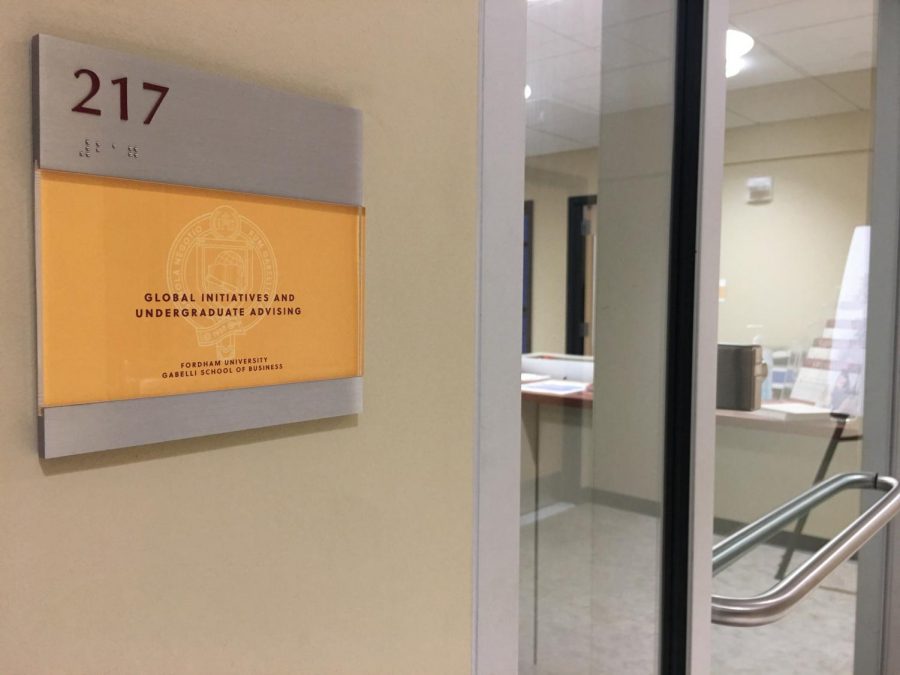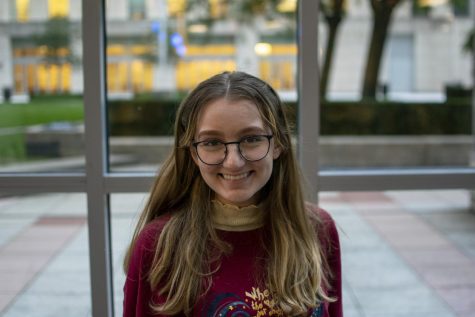Class Registration Shift Aims to Fix Student Inequality
COURTNEY BROGLE/THE OBSERVER
Assistant Dean of the Gabelli School of Business (GSB) Rev. Vincent DeCola, S.J., said that GSB has practiced this register, rest, repeat process for as long as he can remember.
November 15, 2018
The senior spring registration was met with its usual drama — roommates woke each other up early to register at 7 a.m. on the dot, the My Fordham Student Portal went down and students frantically ran to their advisers with questions. However, one small change made a big difference, as class year determined registration date rather than accrued credits. All students graduating the same year registered on the same date.
Class credits still determined one’s time slot to register for next semester’s class roster. But the university’s official timetables were organized to accommodate students that enter Fordham College at Lincoln Center (FCLC) with an abundance of Advanced Placement (AP) or International Baccalaureate (IB) credits, so that they stay on even-footing with their peers during registration. No longer will some people register ahead of their classmates; they now all shared the same registration dates.
Assistant Dean of the Gabelli School of Business (GSB) Rev. Vincent DeCola, S.J., said that while GSB has practiced this register, rest, repeat process for as long as he can remember, it was born out of the strategy that Fordham College at Rose Hill (FCRH) currently employs, where two business days are devoted to registration for one grade level.
“Fordham College Rose Hill, because it’s so big, their class deans didn’t want to have to stress about their entire class on just one day,” DeCola said. “So, they have grade levels over two days … seniors that have a lot of credits and are almost at graduation will register first, and the rest of the seniors will go the next day, followed by higher-level juniors and so forth.” At FCLC, registration is built on the same principle, with seniors on Monday Nov. 5, juniors on Wednesday Nov. 7, sophomores on Friday Nov. 9 and freshman on Tuesday Nov. 13.
“For us that means we focus on our seniors for one day, with a day to rest and catch up, before the next batch,” he added.
Acting Associate Dean Mary Bly, and Interim Dean of FCLC Frederick J. Wertz, said that the decision to alter the registration parameters came from GSB. “It used to be that if you came in with a certain number of credits it would put you into a different registration category,” she said. Challenged with the unfair advantage between students, the deans resolved to fix the system for disenfranchised students.
“You could register before your other peers could, and it didn’t seem fair,” Wertz said. “Particularly for students who may be coming from lower socioeconomic situations … They might be shut out of courses and that didn’t seem fair. We don’t want to privilege students over each other.”
Associate Dean at FCLC Robert K. Moniot, said that while FCRH deans face more issues with the volume of students trying to register, FCLC deans do not. “FCLC and Gabelli felt that it’s unfairly privileging the students who come in with credits setting them ahead of everyone else with earlier registration,” he said.
DeCola noted how beneficial the new system is, giving all students an equal opportunity at Core courses for their major or general studies.
That isn’t to say that students who come in with school credits are left to scrounge together leftover courses. “They can get benefits from that. It doesn’t mean they have an edge in registration the way they did before … they can take fewer courses per semester, they might be able to graduate early, but they shouldn’t have too much of an advantage registering for courses,” Wertz said.
While the change is overall working for a more fair education system, Moniot noted there are some kinks. Waitlisting is now an option for all courses, meaning deans must consider how to handle students who want to take specific classes, especially depending on class rank.
“That’s the one complication we have right now,” Moniot said. “You’re putting people ahead of those already on the waitlist, and the question is how can we do that in a way that works correctly.”
Stephanie Carola, FCLC ’20, who entered college without supplemental credits, appreciates the equalizing measures to an extent. “That being said, speaking for the people who did come into college with lots of credits, I feel like changing it may be hard for them,” she said. “These students put in the work and earned them before coming to Fordham; they are entitled to seniority compared to someone who may not have put in that same level of work yet.”











